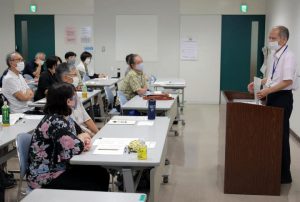Group of second-generation A-bomb survivors kicks off activities by offering pointers on sharing family members’ A-bombing experiences
Sep. 13, 2022
by Masaya Akiyoshi, Staff Writer
A group composed of second-generation atomic bombing survivors offering support to family members of A-bomb survivors recently kicked off its activities at the Otemachi Heiwa Building, in Hiroshima’s centrally located Naka Ward. The group’s aim is to enable the family members to effectively communicate their family’s A-bombing experiences in a program run by the Hiroshima City government. Based on the theme “Communicate family A-bombing experiences,” members presented advice about the city program’s activities at the group’s first meeting, held on September 11. Participating in the meeting were 21 members of the public who wanted to learn about how to communicate, on their behalf, the experiences of family members who experienced the atomic bombing.
The group was established earlier this year, in July, by three A-bomb Legacy Successors, who are trained to pass on testimonies of A-bomb survivors as non-family members. At the September 11 meeting, Sakuko Sasaki, 72, the group’s leader and a resident of Hiroshima’s Nishi Ward, explained to the participants the words spoken by A-bomb survivors that impressed her most among all the testimonies she had heard to that point in time. Ms. Sasaki explained how certain descriptions—for example, of how the smell of cooking fish reminded someone of the horror in which many people died of burns in the aftermath of the atomic bombing—always resonate with audiences.
Takanori Mizuno, 64, a group member living in Hiroshima’s Asakita Ward, advised the attendees to come up with an image of the kind of successor they hoped to become and sort through available information to develop details of a story to communicate about the A-bombing experience.
The Hiroshima City government started the Family A-bomb Legacy Successor program this fiscal year to promote the communication of the A-bombing experiences of family members. However, a prerequisite to becoming such a legacy successor is that people need to be able to listen to the stories of experiences from family members who experienced the atomic bombing and are still alive. The group also aims to support those whose A-bomb survivor family members have died or who have difficulty in learning about family A-bombing stories for one reason or another. Akiko Kikuchi, 56, a resident of the city’s Asaminami Ward said, “I gave up applying for the Family A-bomb Legacy Successor program because I didn’t want to force my mother to recall what she had experienced at the time of the bombing. But I also want to take the opportunity to learn through this group regarding ideas about how best to encourage my mother to pass on her experiences to me.”
Many trainees of the Family A-bomb Legacy Successor program also took part in the event and worked to deepen their understanding. The group will continue to hold meetings at a pace of roughly once a month.
(Originally published on September 13, 2022)
A group composed of second-generation atomic bombing survivors offering support to family members of A-bomb survivors recently kicked off its activities at the Otemachi Heiwa Building, in Hiroshima’s centrally located Naka Ward. The group’s aim is to enable the family members to effectively communicate their family’s A-bombing experiences in a program run by the Hiroshima City government. Based on the theme “Communicate family A-bombing experiences,” members presented advice about the city program’s activities at the group’s first meeting, held on September 11. Participating in the meeting were 21 members of the public who wanted to learn about how to communicate, on their behalf, the experiences of family members who experienced the atomic bombing.
The group was established earlier this year, in July, by three A-bomb Legacy Successors, who are trained to pass on testimonies of A-bomb survivors as non-family members. At the September 11 meeting, Sakuko Sasaki, 72, the group’s leader and a resident of Hiroshima’s Nishi Ward, explained to the participants the words spoken by A-bomb survivors that impressed her most among all the testimonies she had heard to that point in time. Ms. Sasaki explained how certain descriptions—for example, of how the smell of cooking fish reminded someone of the horror in which many people died of burns in the aftermath of the atomic bombing—always resonate with audiences.
Takanori Mizuno, 64, a group member living in Hiroshima’s Asakita Ward, advised the attendees to come up with an image of the kind of successor they hoped to become and sort through available information to develop details of a story to communicate about the A-bombing experience.
The Hiroshima City government started the Family A-bomb Legacy Successor program this fiscal year to promote the communication of the A-bombing experiences of family members. However, a prerequisite to becoming such a legacy successor is that people need to be able to listen to the stories of experiences from family members who experienced the atomic bombing and are still alive. The group also aims to support those whose A-bomb survivor family members have died or who have difficulty in learning about family A-bombing stories for one reason or another. Akiko Kikuchi, 56, a resident of the city’s Asaminami Ward said, “I gave up applying for the Family A-bomb Legacy Successor program because I didn’t want to force my mother to recall what she had experienced at the time of the bombing. But I also want to take the opportunity to learn through this group regarding ideas about how best to encourage my mother to pass on her experiences to me.”
Many trainees of the Family A-bomb Legacy Successor program also took part in the event and worked to deepen their understanding. The group will continue to hold meetings at a pace of roughly once a month.
(Originally published on September 13, 2022)








